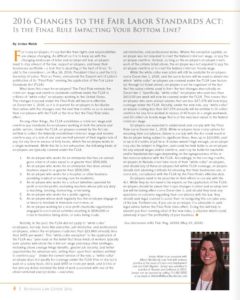
Fair Labor Laws in Nevada
2016 Changes to the Fair Labor Standards Act: Is the Final Rule Impacting Your Bottom Line?
Jordan Walsh is an associate with Allison MacKenzie Law Firm and was asked to explore the Fair Labor Standards Act for Northern Nevada Business Weekly. Her analysis can be found in the 2016 Business Law Publication or read below.
For many employers, it may feel like their rights and responsibilities are always changing. As difficult as it is to keep up with the changing landscape of labor and employment law, employers need to stay abreast of the law, support employees, and keep their businesses profitable – a task that is daunting at the best of times. To add to the conundrum, on May 18, 2016, President Obama and the U.S. Secretary of Labor, Thomas Perez, announced the Department of Labor’s publication of its “Final Rule” revising the application of the Fair Labor Standards Act (FLSA).
What does this mean for employers? The Final Rule extends the minimum wage and overtime standards outlined under the FLSA to millions of “white collar” employees working in the United States. The changes imposed under the Final Rule will become effective on December 1, 2016, so it is important for employers to familiarize themselves with the changes over the next few months so as to ensure their compliance with the FLSA at the time that the Final Rule takes effect.
Among other things, the FLSA establishes a minimum wage and overtime pay standards for employees working in both the private and public sectors. Under the FLSA, employees covered by the Act are entitled to collect the federally established minimum wage and receive overtime pay, at a rate of one and one-half percent of their regular rate of pay, for any time in excess of forty hours, which the employee works in a single workweek. While this list is not exhaustive, the following kinds of employees are typically covered under the FLSA:
1. An employee who works for an enterprise that has an annual gross volume of sales equal to or greater than $500,000.00;
2. An employee who works for an enterprise that does annual business equal to or greater than $500,000.00;
3. An employee who works for a hospital, or other business providing medical or nursing care for residents;
4. An employee who works for a school (whether operated for profit or not-for-profit), excluding teachers whose primary duty is teaching, tutoring, instructing, or lecturing.
5. An employee who works for a public agency;
6. An employee whose work regularly has the employee engage in or become involved in interstate commerce; or
7. An employee working for a non-profit charitable organization engaged in commercial activities resulting in $500,000.00 or more in business being done, or sales being made.Notably, in the past, the FLSA did not apply to “white collar” employees; namely, bona fide executive, administrative, and professional employees, unless the employees made less than $23,660.00 annually (less $455.00 per week). This “white collar exception” to the application of the FLSA was “premised on the belief that these kinds of workers typically earn salaries well above the minimum wage and enjoy other privileges, including above average fringe benefits, greater job security, and better opportunities for advancement, setting them apart from workers entitled to overtime pay.” Under the current version of the rule, a “white collar” employee does not qualify for coverage under the FLSA if he or she (a) is paid on a salary basis, (b) is paid $455.00 or more per week, and (c) his or her primary duties involved the kind of work associated with one of the aforementioned exempt duties – executive, administrative, and professional duties. Where this exception applied, an employer was not required to meet the federal minimum wage, or pay the employee overtime. Instead, so long as the employer’s employee meets each of the criteria listed above; the employer was not required to pay the employee overtime or to meet the federal minimum hourly wage.
While the white collar exemption will still be available for employers come December 1, 2016, and the same factors will be used to determine which “white collar” employees are covered under the FLSA (see factors (a) through (c) listed above), employers must be cognizant of the fact that the salary criteria used to from the test changes dramatically on December 1st. Specifically, “white collar” employees who earn less than $913.00 per week will now be covered under the FLSA. This means that employees who earn annual salaries that are less $47,476.00 will now enjoy coverage under the FLSA. Notably, under the new rule, any “white collar” employee making less than $47,476.00 annually will be entitled to (i) collect overtime for any time worked in excess of 40 hours in a single workweek, and (ii) collect an hourly wage that is at the very least equal to the federal minimum wage.
Employers are expected to understand and comply with the Final Rule come December 1, 2016. While employers have many options for ensuring their compliance, failure to comply with the Act could result in the employer being subject to significant fines, fines up to $10,000.00; and/or up to 6 months of jail time. If stakes weren’t high enough, an employer may also be subject to litigation, and could be held liable to an employee for any unpaid wages and/or overtime, and may be liable for equitable and/or liquidated damages depending on the egregiousness of his or her non-compliance with the FLSA. Accordingly, in the coming months, employers in Nevada must take stock of their “white collar” employees, and should any of these employees fall within FLSA coverage, employers should start planning methods for ensuring that their businesses are, or come into, compliance with the FLSA by the Final Rule’s effective date.
Employers need to be proactive in their efforts to comply with the Act. While they do not need to be experts on the application of the FLSA; employers should be aware that major changes to labor and employment law will be taking effect come December 1st, and should they have any questions or concerns regarding their compliance with the law, they should seek legal counsel to assist them in navigating this complex area of the law. Furthermore, if you are an employer, it is advisable to seek legal advice before the Final Rule takes effect. Doing this will help to prevent you from running afoul of the new rules, a situation which could adversely impact the profitability of your business.
About Jordan Walsh
Jordan Walsh is an associate with Allison MacKenzie Law Firm with primary practice in the areas of Labor and Employment Law and Civil Litigation. Jordan was admitted to practice in Nevada and California in 2014. Jordan can be reached by calling 775.687.0202 or by email at [email protected].






